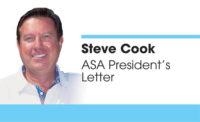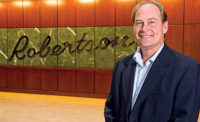Steve Cook knows a little something about forward momentum.
Cook, the CEO of Baltimore-based Northeastern Supply, has his distributorship on a clear path of success and continued growth. He’s also super-excited about taking the reins in January as the American Supply Association’s 50th president (and 51st individual to hold the presidency) during the group’s 50th anniversary year as ASA continues to provide unprecedented value and resources to its members.
“ASA has some great momentum,” Cook says. “We’ve made a lot of progress.”
Cook’s path to ASA leadership started when he joined Northeastern Supply out of Loyola College in 1983. Northeastern was started in 1945 in the northeastern section of Baltimore. Cook’s dad, John H. Cook lll, who he describes as a “great man,” went to work for Northeastern as branch manager in 1964 and bought the company in 1972. When Cook started in 1983, Northeastern had two locations. He quickly worked to computerize the company, which started it on a slow growth trajectory. He took over the company in 1991 and has grown it to 34 branches and 325 employees who serve customers in Maryland, Delaware, Pennsylvania, Virginia, West Virginia and the District of Columbia.
“Right now, we are firing on all cylinders,” he says. “Our residential business is strong, our commercial is strong, heating and air is strong and so is our water-systems business. We continue to take market share. Things look good.”
Cook says Northeastern knows it must never rest on its laurels in a competitive Mid-Atlantic region. “The contractor can buy the products we sell all over the place. It’s the same stuff at the same price,” he explains. “We really try to work harder than the competition and we play harder than our competition. We do a lot of fun and entertaining stuff with our employees and customers.”
He’s also quick to point out that while Northeastern has blossomed into a 34-branch enterprise in four states and the District, it still stays true to its roots. “Even through we’ve grown to a pretty substantially sized organization, we’ve worked hard to maintain those family morals and values,” Cook says.
Northeastern made headlines earlier in the year when Cook stepped aside as company president (he remains CEO) and hired former MORSCO executive Stan Allen as the new company president. He also brought his daughter, Stephanie, aboard as director of training and safety. Both hires were made with the future in mind.
“We hired a new president and that was really to reenergize the company,” Cook says. “I had been running the company for 31 years, and felt like I wasn’t giving it 110% and I feel like our team deserves 110%. Stan brings in fresh blood, fresh ideas and fresh enthusiasm. He’s been huge for us. I’m still in the office most days, but now we have a guy with boots on the ground leading the charge every day. That bodes really well for us.”
Cook says continued growth means the need to ramp things up on the training side, hence the addition of his daughter. “Training truly was something the company was not that great at before,” he says. “We’re on a pretty hard growth pattern and training is something we have to do to develop our people and keep up with the industry.”
Cook notes while the hiring of Allen as company president has been a major positive, Northeastern would not be where it is at today without the continued contributions of senior management, including the likes of Steve Coppage (vice president of business development), Mike Cornbrooks (vice president of operations), Alan Cowan (vice president of sales), Russ Everson (vice president of HVAC sales), Lori Everson (corporate credit manager), Frank Collacchi (IT head), Lisa Nagel (corporate controller) and the distributor’s regional management team.
“During my career what I am most proud of is the excellent management team we have been able to develop,” he says. “They all are good, solid and talented people.”
Cook admits during the recent recession, Northeastern didn’t quite lay low, but “tucked our wings in a little bit and made sure our finances were solid.”
Current day, the gloves have come off. “I think it’s pretty obvious with the new president in place and the hiring of my daughter into the company that we are back up on the saddle,” Cook says. “We are looking to grow organically and we are eyeing some acquisitions.”
The importance of ASA
When Cook joined Northeastern in the 1980s he became involved with ASA. “I’ve been heavily involved with ASA since I came here out of school,” he says. “Our industry certainly is still dominated by the big boys, but by and large this still is a fragmented industry. I look at ASA as the glue that holds the entire industry together.”
Today, Northeastern makes good use of all ASA has to offer from its vast training resources to the support it receives on the advocacy front. “The training aspect ties into my daughter’s hiring. We utilize ASA education very hard,” Cook says. “We are setting and creating career paths for the people here at Northeastern. Today’s millennials really want to know where they are going to be in one, three and five years. We’re working hard on that front.”
Cook also loves the advocacy piece of the pie that ASA provides. “I enjoy our trips to Capitol Hill that are organized by ASA,” he says. “They are eye-opening, exhilarating and frustrating, but at the end of the day it’s something every American should do on a regular basis. It’s the only way you can make a difference. I describe it this way: When I drive home from the Hill I am smiling and also beating my head against the windshield. You do everything you can to get your point across, but sometimes you get caught up in a lot of bureaucracy and you feel like maybe you didn’t get through. But you can’t sit at home and complain about what’s going on in Washington. You have to get out there, try your hardest and be heard.”
Cook has seen ASA come a long way in a short timeframe. “I’ve been involved with this for a long time,” he says. “Clearly there was a period where ASA really lost its way and became non-relevant. It was very frustrating to me that the leader of our industry went sideways. That’s when I got reengaged. I made the decision to dive in and make a difference. I think we’ve done that. I think we are in a good spot. The ASA staff and the volunteer team currently in place are first-class. My goal as president is to not mess it up. My goal is to keep things rolling. Let’s stay on our path because we are doing great.”
Cook’s advice to someone thinking about ASA membership or becoming a volunteer leader in the association is to realize it’s a serious commitment. “It’s real in terms of both time and energy,” he says. “It’s a substantial commitment, but this is a great industry with great people. This industry has been very good to a lot of us. At the end of the day, it’s a lot of time and energy, but man it’s worth it!”






